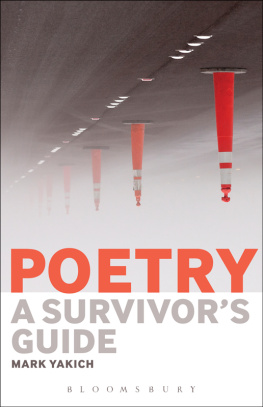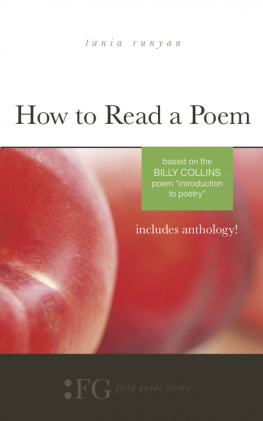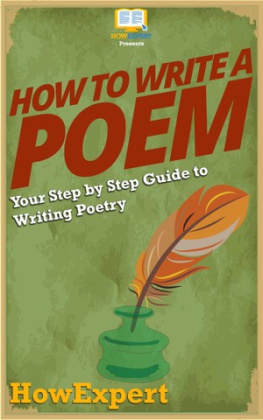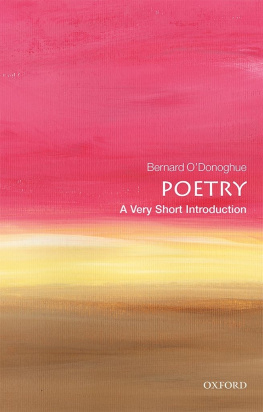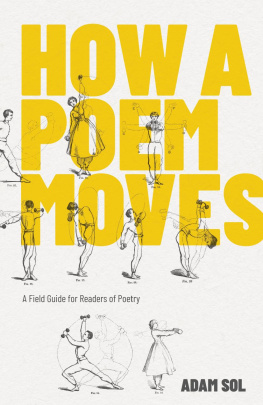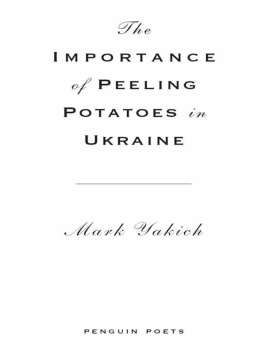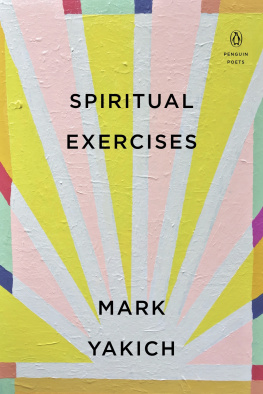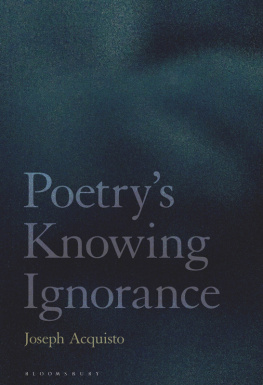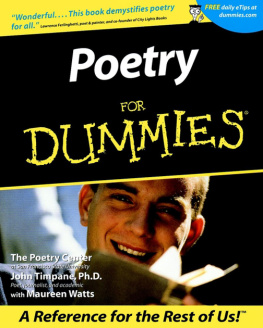POETRY
A Survivors Guide
ALSO BY MARK YAKICH
Poetry Collections
Unrelated Individuals Forming a Group Waiting to Cross
The Making of Collateral Beauty
The Importance of Peeling Potatoes in Ukraine
Green Zone New Orleans
Poetry for Planes
Spiritual Exercises
POETRY
A Survivors Guide
MARK YAKICH
Bloomsbury Academic
An imprint of Bloomsbury Publishing Inc

For my students
Beware of advice, even this.
Carl Sandburg
This book is a survivors guide. Not the survivors guidejust one of many possibilities.
Maybe youve picked it up because something inside you said or is saying, I must have poetry as I must have air! or I think poetry might be good for me, like a piece of fresh fruit or a handful of nuts. Maybe theres another reason entirely. Whatever the case, please know that the propositions, tenets, and techniques that follow are merely techniques, tenets, and propositions. What some readers may find serious or imperative, others will find whimsical or impractical. What some may find useful, others wontand vice versa. If theres a single aim here, it is to help you understand and experience language as a system of and in play. As Kafka once said, A book must be an axe for the frozen sea inside us. But it may be equally stimulating to recast his sentence: A book is a frozen sea waiting for the axe inside us.
Let us, then, break ice.
Today I am a poet. But that may be only because for a long time I wasnt. As a child I found the little tomes of Dr. Seuss insufferable, and I enjoyed the itsy-bitsy spider not for its sweet song but for Mothers delicate fingernail tickles. I checked books out of the library because my parents and sister did: each of us would get the borrowers limit of twenty books, and back at home Id dutifully haul them upstairs to my room and set them on my nightstand. Over the two-week lending period, Id ignore the books except to note how well or poorly they provided decoration to the room. The night before they were due, I would pick up the tower, topple it onto the bed, and study the covers as one would the surfaces of rocks. I dont recall any of the books ever including poems, but they could haveI rarely opened them.
In grade and middle school, the only thing I remember reading and writing were love letters, carefully folded in triangles like the flags of remote countries I couldnt name. And looking back, I believe I wrote and read those letters because they seemed to be required by the romance of cartoons and sitcoms.
The first poem I remember hating was Coleridges Kubla Khan, on which I had to write a report in tenth grade. My English teachers name was Mrs. Vrba (pronouncedyesver-ba). She had a broken foot for most of the year, and I had once arm-wrestled her daughter Tricia in seventh grade. Tricia and I had been at the State Science Fair at the University of Illinois at Champaign-Urbana. I took first place with a zoology project about how horseshoe magnets affected earthworms (Mothers idea; she also typed and wrote most of the report; I was proficient at the design and stenciling of the peg board; Father did the sawing and the screwing); but more importantly I took Tricias hands in mine in the indoor/outdoor pool at the Howard Johnsons one barely lit afternoon. I hope Tricia, too, can still recall how we detained each other in that lukewarm bath, our hands glossing each others trunks. Telling myself this story of Tricia during her mothers poetry lessons was the only way I saw poetry as relevant: it served merely as a distraction from real life.
In college I took one English class (expository writing), and I majored in political science. Instead of love letters, there was now lovemaking. I enjoyed it much more than writing, and hoped that my partners did as well. Before I was twenty-five, I had read three novels, of which two were The Catcher in the Rye. Thats not a boast; rather, its something Im ashamed oflike a fear of flying. But when I was twenty-five I moved to Belgium on a research grant and began living in a one-room lean-to attached to a fourteenth-century building in the small college town of Leuven where everyone around me spoke Flemish. In other words, I was isolated and had no friends. I soon realized, however, that books and the voices in them made for decent companionship. And because most poems are brief, I could make a lot of friends fast.
For years I wouldnt admit to being a poet. The role seemed wholly unfit for modern life. Now I am a professor and teach poetry for a living, which, to me, is at once a silly and vital occupation. The poet Marianne Moore once called poetry contemptible and genuine in the same breath, which is not the same thing as calling it genuinely contemptible. For the same reason poetry is irrelevant as compared to, say, heart surgery or firefighting or trash collecting, it is also important. Because poetry doesnt make money, it almost always escapes commodification.
Poetrys irrelevance, therefore, becomes its importance. And the two qualities link up in my head, as in this poem by A. R. Ammons:
Small Song
The reeds give
way to the
wind and give
the wind away
These four lines were some of the first lines of poetry I ever enjoyed. I could and could not make out what they were telling me. These seven words (a few repeated) couldnt have been any simpler and yet they made (and still make) my mind do little backflips. As in W. B. Yeats famous line How can we know the dancer from the dance? I still keep trying to discern which is which: Are the reeds only reedy because theyre moved by the wind, or is the wind only windy because we detect its effects? It is, of course, not necessary to decide between the two. But no matter how many times I read the poem, I feel ridiculously compelled to pick one over the otheras if Ive just survived an airplanes water landing and must choose between my wife or our son, only one of whom I can save.
*
For poetry, according to any number of young, emerging, or weathered poets, is all about survival. Not the Im-good-in-an-emergency kind, but the lets-get-through-this-day kind. The truth is that being a survivor often simply comes down to being alive. Being your own star witness to the ending that is always inside you. And being considerate to all those who came before. The fathers and mothers who got together and sometimes loved each other; their endings, too, are in you. All those screaming nights, sleep-filled babies, beans harvested as they were dying on the vines. All those men who killed other menreligion or notbludgeoned them with rocks, gutted them with sharpened sticksblood for honey, flies atop dead bodiesand all those women who were taken in caves or behind bushes or on downy meadows and then lobbed over cliffs. The dead and the super dead. The thousands of generations, all of itevolution or notcoming to a head right now. Your head, literally, so that if you put your middle finger gently into your ear, you can hear the low-pitched hum of a spacecraft travelling through time. Earth. And yet here you are, still as a book splayed on a shelf, bored by the idea of looking at the stars one more time.
No one should tell you how or what to think, I know. It feels oppressive or tedious, or it intimates that you be humbler than you are. When I was a student of creative writing programs, I too was an ironist-cum-sentimentalist. And I desperately sought a guide that would help me survive what I had gotten myself into. Help me, that is, to understand poetry without obfuscating it in literary jargon or dumbing down the practice of writing as variations of write what you know or breezy workouts in form. Too many texts were either dry primers bent on rote knowledge (e.g., What is a synecdoche? Who was Hamlets best friend?), or theoretical tracts with esoteric agendas (e.g., What is that tension between the temporal decay of voice and the expectation of lyric closure if not the formal mapping of the dynamics of desire?). Such books, I imagine, have their respective places in poetry, but neither provides a practical
Next page
